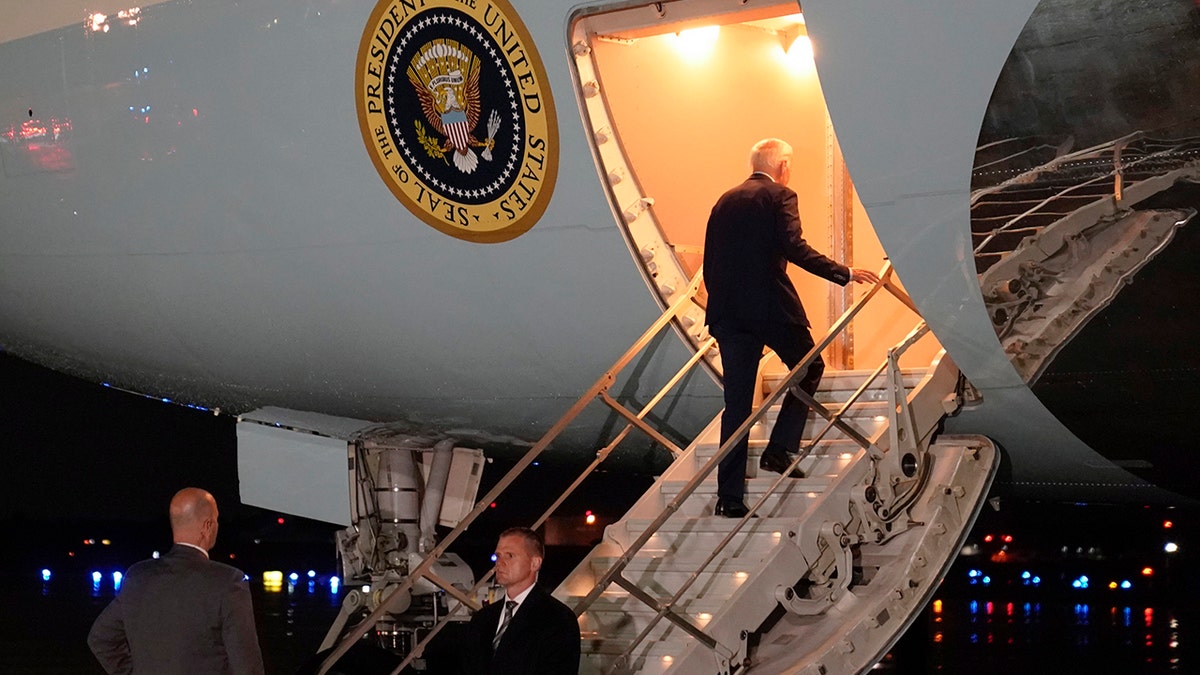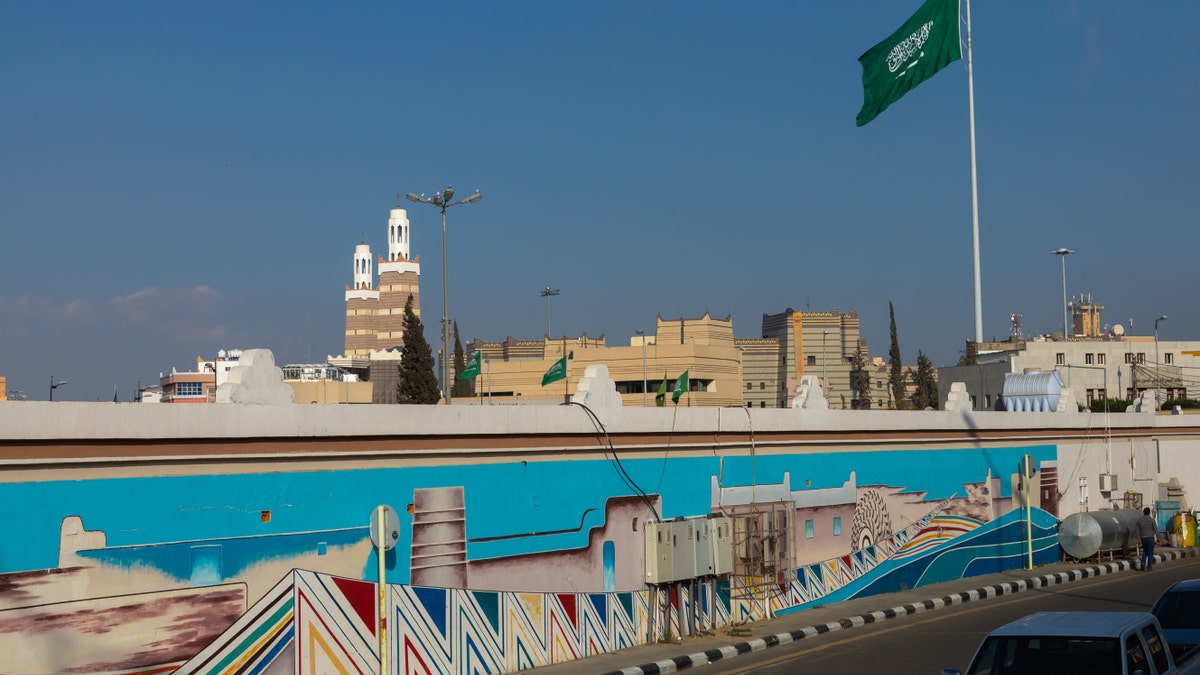Biden slated to meet with Saudi crown prince in controversial Middle East trip
Fox News foreign correspondent Trey Yingst has the latest on President Biden's trip to the Middle East on 'America Reports.'
Will President Joe Biden and Saudi Crown Prince Mohammed bin Salman be holding their noses when they meet during Biden’s first trip as president to Saudi Arabia on Friday?
To say there is no love lost between the 79-year-old American president and Saudi Arabia’s 36-year-old de facto ruler is an understatement. The two men obviously loath each other.
During the campaign, Biden lambasted President Donald Trump for overlooking bin Salman’s human rights abuses, especially the gruesome 2018 murder and dismemberment of Jamal Khashoggi, the Washington Post contributing columnist.
BIDEN HEADS TO MIDDLE EAST TO PITCH IRAN NUCLEAR DEAL TO UNEASY ISRAEL, SAUDI ARABIA
One of Biden’s first acts as president was to release the CIA assessment that MBS, as the Saudi prince is known, had ordered the killing (a charge he denies.) Pledging to treat the kingdom and its de facto ruler as "the pariah that they are," Biden froze offensive arms sales to the kingdom and imposed sanctions and travel bans on Saudis linked to the killing, but as several veteran analysts noted, not on MBS himself.

President Joe Biden boards Air Force One for a trip to Israel and Saudi Arabia, Tuesday, July 12, 2022, at Andrews Air Force Base, Md. (AP Photo/Evan Vucci)
Even after plans of the visit leaked, Biden’s discomfort was evident. Initially denying that he would visit the kingdom, Biden tried to justify the trip by saying that he was meeting several other Arab rulers in Jeddah. In a Washington Post op-ed days later, Biden wrote that the goal of his visit "from the start" was to "reorient" but not "rupture" relations with the kingdom, "a strategic partner for 80 years." But even in his op-ed, Biden could not bring himself to mention the crown prince by name.
The disdain is apparently mutual. Having reportedly refused to take a call from Biden in the run-up to Russia’s invasion of Ukraine, MBS told the Atlantic magazine when asked if Biden misunderstood him, "Simply, I do not care."
But realpolitik — or riyal politique, in this case — has led both men to recalculate. Biden decided on the trip after Russia’s unprovoked invasion of Ukraine helped push gas prices to the stratosphere and his approval ratings down to treacherous territory. While critics have blasted the about-face as an abandonment of his commitment to human rights, supporters have welcomed it as a return to a more traditional stance that reflects the priority of oil and geopolitics over a desire to isolate the kingdom for its human rights abuses.
"We can all agree that no one should be killed, dismembered and cooked in a Tandoori oven in Istanbul," said David Schenker, a Middle East expert who served in the Trump administration. "But is Saudi Arabia’s human rights record really that much worse than, say, Egypt’s?"
Given COVID-19, and instructions for Biden before he left the U.S., there probably won’t be a handshake. There will surely be no hint of a bow, which President Barack Obama appeared to make when he met then Saudi King Abdullah in 2009, and President Donald Trump did, too, when he received a civilian medal from MBS in 2017. There will be no hand holding, an Arab tradition among men, which President George W. Bush did when he greeted the Saudi king at his Texas ranch in 2005. Nor will there be any air kisses on this kiss-and-make-up trip.
Both men want the trip to appear successful. For MBS, argues veteran Saudi expert Gregory Gause, Biden’s visit will bestow the political rehabilitation he craves. MBS also wants Biden’s recognition of the dramatic social and economic changes he has made as part of his Vision 2030 — letting women drive, ending their segregation in public, containing the odious religious police, allowing music concerts and cinemas, and ending at least official support for radical Islamist preachers and schools at home and abroad.
CLICK HERE TO GET THE OPINION NEWSLETTER
He also wants Biden to return the Patriot missile batteries he withdrew as Iranian-backed Houthis in Yemen were pounding Saudi oil facilities and the lifting of the suspension on sales of offensive weapons. Above all, he seeks assurances that the U.S. will protect the kingdom from Iran, particularly as Biden’s efforts to revive the 2015 nuclear deal with Tehran, have stalled.
While the Saudis might announce greater open public cooperation with Israel – say, expanding overflight rights or allowing direct flights for religious pilgrims – King Salman, the ailing, 86-year-old ruler, is unlikely to establish formal ties with Israel now as several other Arab states have done under the 2020 Abraham Accords, Trump’s most notable Middle East achievement. While the Saudis might announce improved air defense coordination against Iranian missile and drone strikes, this is likely to fall short of much-touted "Arab NATO" that officials in the region have been discussing. But the visit could lead to enhanced air defense should Iran move towards nuclear "breakout" and an atom bomb.

ABHA, SAUDI ARABIA - JANUARY 03: Saudi arabian flag in front of a fresco, Asir province, Abha, Saudi Arabia on January 3, 2020 in Abha, Saudi Arabia. (Photo by Eric Lafforgue/Art in All of Us/Corbis via Getty Images)
Biden, too, has much at stake. Though few analysts think the Saudis will agree to pump more than the 648,000 barrels per day as OPEC has already announced, the White House hopes that the trip will end the kingdom’s tilt toward Russia and China.
CLICK HERE TO GET THE FOX NEWS APP
Critics like Saad Aljabri, the deputy chief of Saudi intelligence and Washington’s valued partner in combating Islamic terrorism who is now a political refugee in Canada, warn that MBS will not change. While Aljabri calls him a "psychopath," optimists hope the visit may help contain MBS’s worst instincts. While arrests of Saudi dissidents continue, they say, MBS has worked to extend the ceasefire of the war he started in Yemen against the Iranian-backed Houthis, another appalling human rights disaster. Robert Satloff, who heads the Washington Institute for Near East Policy, argues that Saudi foreign policy under MBS is considerably "less adventurous, less rogue" than it was several years ago.
Most important, he and others say, the visit marks the start of efforts to resuscitate the U.S.-Saudi relationship. Given the geo-strategic stakes involved, that is not only wise, but long overdue.











































